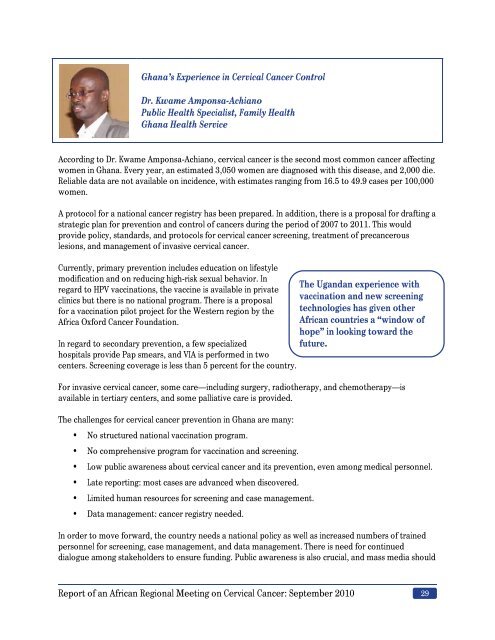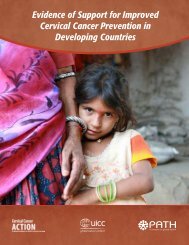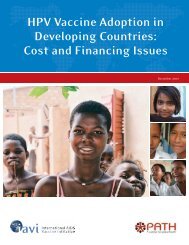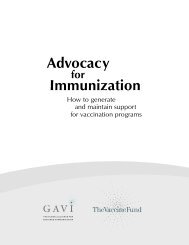Download file, English (1 MB PDF) - RHO
Download file, English (1 MB PDF) - RHO
Download file, English (1 MB PDF) - RHO
Create successful ePaper yourself
Turn your PDF publications into a flip-book with our unique Google optimized e-Paper software.
Ghana’s Experience in Cervical Cancer Control<br />
Dr. Kwame Amponsa-Achiano<br />
Public Health Specialist, Family Health<br />
Ghana Health Service<br />
According to Dr. Kwame Amponsa-Achiano, cervical cancer is the second most common cancer affecting<br />
women in Ghana. Every year, an estimated 3,050 women are diagnosed with this disease, and 2,000 die.<br />
Reliable data are not available on incidence, with estimates ranging from 16.5 to 49.9 cases per 100,000<br />
women.<br />
A protocol for a national cancer registry has been prepared. In addition, there is a proposal for drafting a<br />
strategic plan for prevention and control of cancers during the period of 2007 to 2011. This would<br />
provide policy, standards, and protocols for cervical cancer screening, treatment of precancerous<br />
lesions, and management of invasive cervical cancer.<br />
Currently, primary prevention includes education on lifestyle<br />
modification and on reducing high-risk sexual behavior. In<br />
regard to HPV vaccinations, the vaccine is available in private<br />
clinics but there is no national program. There is a proposal<br />
for a vaccination pilot project for the Western region by the<br />
Africa Oxford Cancer Foundation.<br />
In regard to secondary prevention, a few specialized<br />
hospitals provide Pap smears, and VIA is performed in two<br />
centers. Screening coverage is less than 5 percent for the country.<br />
For invasive cervical cancer, some care—including surgery, radiotherapy, and chemotherapy—is<br />
available in tertiary centers, and some palliative care is provided.<br />
The challenges for cervical cancer prevention in Ghana are many:<br />
• No structured national vaccination program.<br />
• No comprehensive program for vaccination and screening.<br />
• Low public awareness about cervical cancer and its prevention, even among medical personnel.<br />
• Late reporting: most cases are advanced when discovered.<br />
• Limited human resources for screening and case management.<br />
• Data management: cancer registry needed.<br />
The Ugandan experience with<br />
vaccination and new screening<br />
technologies has given other<br />
African countries a “window of<br />
hope” in looking toward the<br />
future.<br />
In order to move forward, the country needs a national policy as well as increased numbers of trained<br />
personnel for screening, case management, and data management. There is need for continued<br />
dialogue among stakeholders to ensure funding. Public awareness is also crucial, and mass media should<br />
Report of an African Regional Meeting on Cervical Cancer: September 2010 29
















